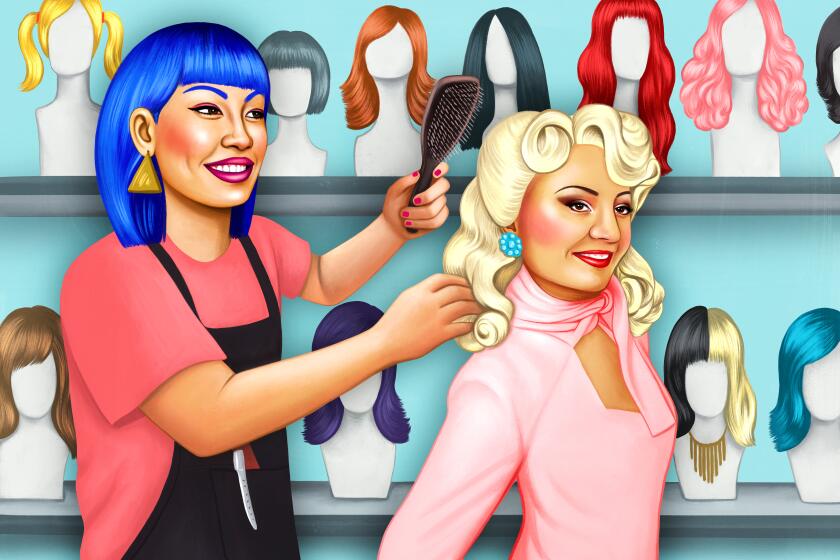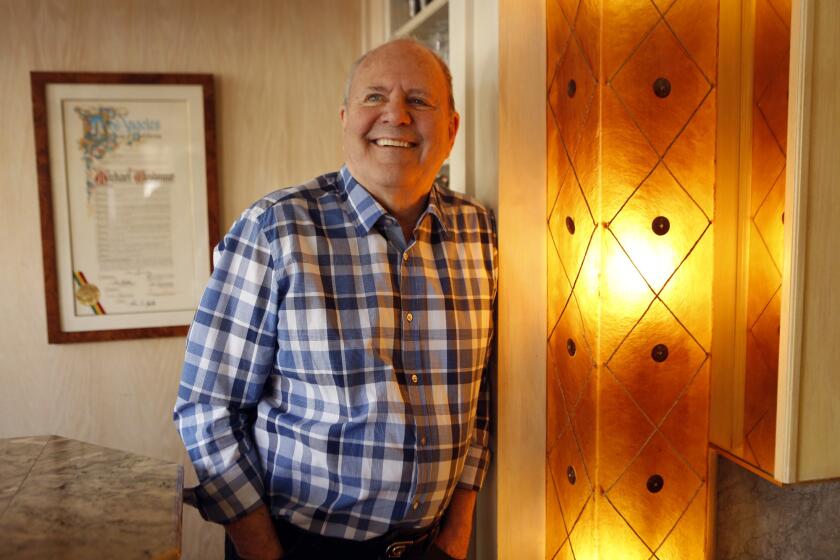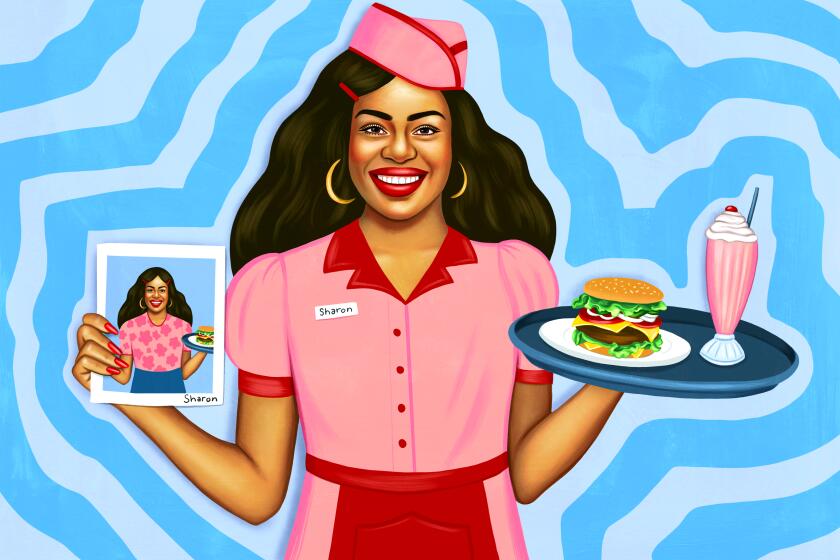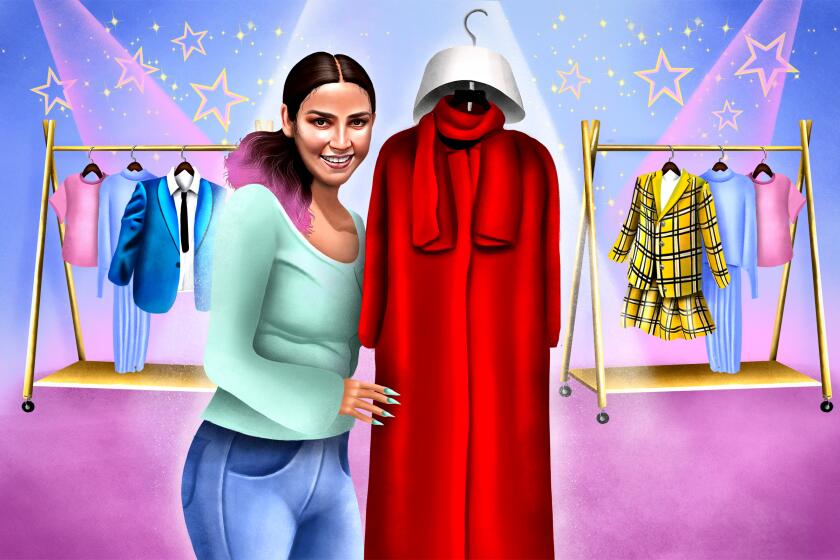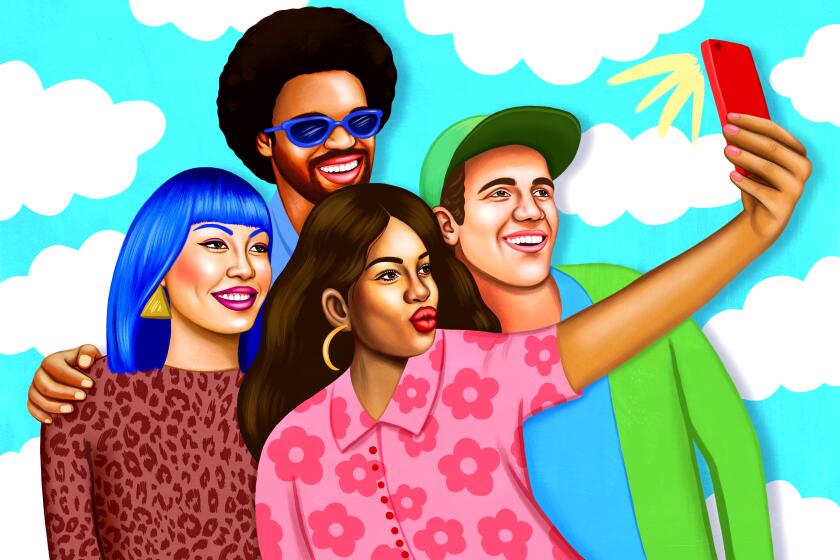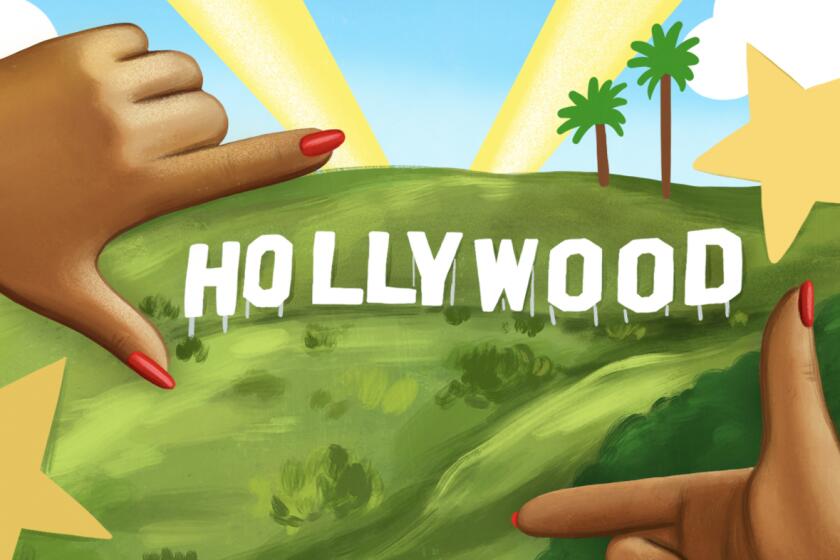Explaining Hollywood: How to get a job as a makeup artist
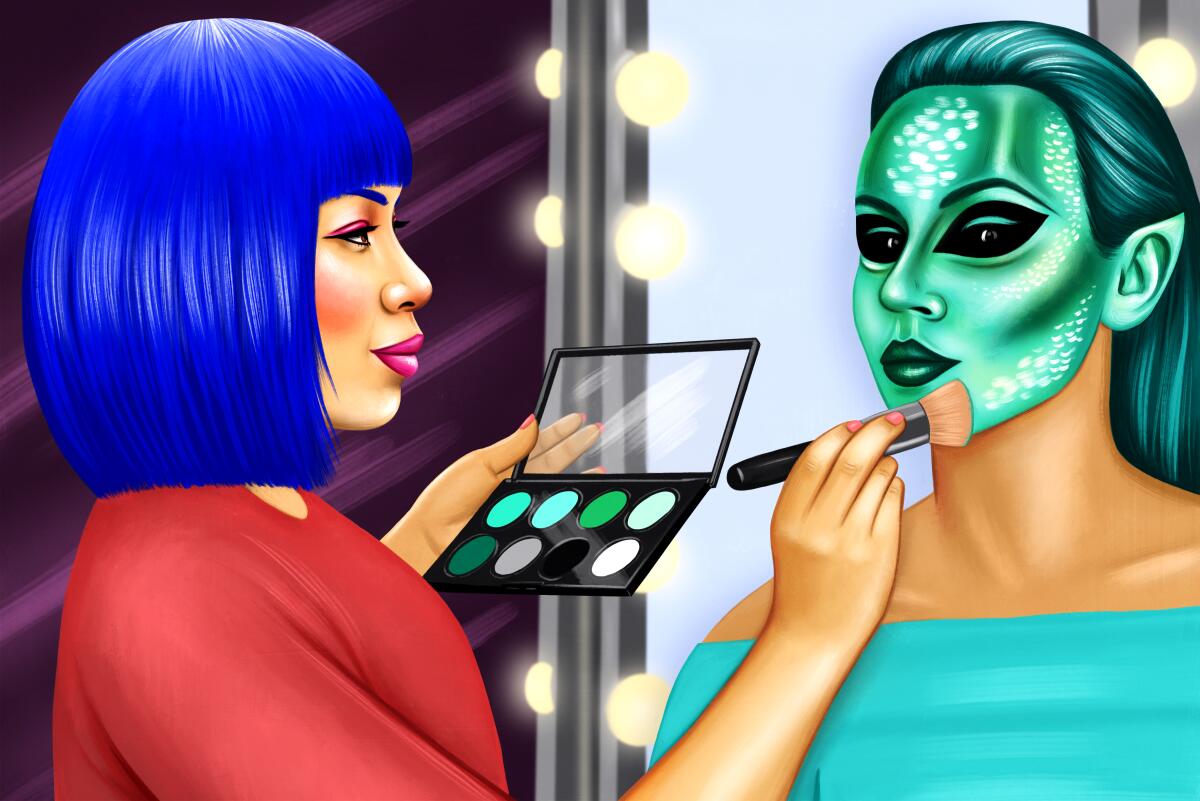
- Share via
Betelgeuse. Edward Scissorhands. Mrs. Doubtfire. Jack Sparrow.
Just saying their names makes the characters materialize in your mind.
The deep, purplish-black eyes of “the ghost with the most.” The delicate stitches of the scissor-handed hair-stylist. The wavy coif and puffy jowls of the father disguised as a matronly housekeeper. The eyeliner and locs of the Caribbean’s most infamous pirate.
Ve Neill, a makeup artist who’s won three Oscars (and garnered eight nominations), is the person responsible for bringing the concept of these characters to life. Her work illustrates the central role these artists play in the Hollywood dream factory.
The Times asked four makeup professionals — Neill, Ashley Hines, Ally McGillicuddy and Jennifer “JQ” Quinteros — for advice on how to get into and succeed in this line of work. Here are their insights.
Who becomes a makeup artist?
Hines, who is just starting her career, and Neill, who has decades of experience, agree that anyone with a zeal for makeup can pursue the career. But there are a few things to keep in mind.
Like many other roles in Hollywood, becoming a successful makeup artist requires not just talent but also a willingness to do some grinding and the ability to finesse your way around obstacles.
Taking inspiration from YouTuber creators, Hines started out by doing her own makeup. She’d experiment with different beauty and special effects looks on her Instagram account. As she continued exploring the craft, she slowly began to delve into special-effects makeup, simulating cuts with scar wax and gel blood and applying prosthetics to completely transform herself. Now, she’s pursuing a career in it.
McGillicuddy always knew they wanted to work in Hollywood. And when the game show “Face Off” (which featured Neill as a judge) first ran on Syfy in 2011, McGillicuddy decided that makeup artistry, particularly special-effects makeup, was the path they wanted to take.
“I realized, yeah, that’s a job, I can be a makeup artist,” they said.
Before Neill began doing makeup, she frequented science-fiction conventions in the ‘70s. One day she stumbled on a group of actors in “Planet of the Apes” costumes.
What she thought were masks turned out to be intricately done special-effects makeup — something she’d go on to be an expert in.
“I said, ‘Can you teach me how to do that?’,” Neill recalls. “And they said, ‘But you’re a girl.’ And I said, ‘I know. Isn’t it fabulous?’”

How do you get started?
Some training in the art is a must for this line of work, Neill said.
Even though YouTube offers a wealth of educational material on the subject, there is nothing that replaces hands-on experience, she said — especially in the fabrication of the prosthetics used for some makeup effects.
Hines has been a student at Cinema Makeup School in Los Angeles for a little over six months. To her, the process has been worth it.
“I’m learning from some of the best in the business,” she said.
But getting started is expensive — as in, more than $30,000 expensive for comprehensive education, including tuition, lab fees and a starter kit.
Even without school, Quinteros cautions that becoming a makeup artist is an upfront investment with a slow return.
You have to have your own kit, and unlike other departments, you can’t reuse most products,she said. “You don’t get it back at the end of the show.
“You don’t get the prosthetics back. You don’t get the foundation back in the bottle,” she added.
McGillicuddy didn’t go to makeup school. Instead, they majored in communications and minored in fine arts at Fitchburg State University in Massachusetts. For the internship required to earn a degree, they decided to come to Los Angeles to work with a makeup artist. They haven’t looked back since.
While perfecting your craft, Neill said, you’ll need to be relentless in making connections. They’re your ticket in.
“Back then, we didn’t call it networking,” she said. “It was word of mouth. I got a job because I knew the five other people that did makeup effects.”
As the story goes with many Hollywood careers, you’ll most likely start out as someone’s assistant.
Hines said that some of her professors who are working on productions will bring students along to help. The harder you work in class and on set, she said, the more likely you are to start building rapport, which will later turn into job opportunities.
At the Cinema Makeup School, Hines is learning how to do all aspects of makeup work, opening her to a much wider scope of job opportunities than would be available to someone who wants to specialize in one thing.
And being a makeup and style jack-of-all-trades is your best bet for getting into and staying in the business, Neill said. Knowing how to do beauty and special-effects makeup, hair and a little costuming can help set you apart from other applicants.
Quinteros is a case in point. She’s best known for her work on “Outer Range,” “Snowfall” and “Clemency,” which she described as a “merge of many makeup looks, from beauty, period and character to prosthetics and special effects.”
A specialist in special-effects makeup, Quinteros gained experience by working as a makeup artist on set for short films being produced by students at the American Film Institute. She is now a Cinema Makeup School graduate, in addition to having more than 150 credits listed on IMDb.
If you can’t afford an education, Quinteros said, you still have options to break into this industry. She suggested contacting special-effects artists you see on Instagram, or even reaching out to the professional makeup artists whose work on TV productions you admire.
“Have them point you in the right direction or take you under their wing and start assisting them,” she said.
It takes a team to design the hair in a film or television show, whether the goal is to impress viewers with intricate styles or to make the hair so seamless that no one thinks about it.
What are the career paths?
As you begin to build your portfolio, you can progress from assistant to makeup artist to makeup department head, like Neill.
According to Quinteros, one of the biggest misconceptions about the makeup department as a whole is that there is a set number of anything. The department’s hierarchy at any given point depends on what the makeup is, how many actors are involved, how many times an actor goes through makeup and how much time the sessions require, she said.
“The hardest thing about trying to talk to new makeup artists is, everybody wants a box that they can put these constraints in. But we don’t really have boxes here ... It’s a bubble” that grows or shrinks according to the job.
But even though the size of the makeup department on set will vary, there will always be a certain number of key people. And that starts with a department head, whose job includes hiring and supervising members of the team, finding the right materials needed for each set, lining up a lab to fabricate prosthetics and special effects, if needed, and applying makeup.
Another vital member of the team is the person who removes makeup after actors are done for the day. “Everybody forgets how long it takes to remove that makeup,” Quinteros said. A third important piece: A person who cleans brushes and has all materials ready to apply or remove.
“Mystique from ‘X-Men’ is a really amazing example of makeup from head to toe,” Quinteros said. “There’s no clothing. There were zero times where Mystique was in an [X-Men] suit for that story. For the most part, she is a creature, and so the [clothes] that she has are the silicone prosthetics that are applied.”
Quinteros worked on the set under the artistic guidance of the makeup department head’s Lufeng Qu.
“She had eight women involved to do the makeup all at one time.” By the way, Quinteros said, “It took about a year to find the blue that she would be.”
Hollywood has had more than its share of dynasties such as the Barrymores (actors John, Ethel, Lionel and Drew) and the Hustons (actors Walter, Anjelica and Jack and director John).
How do you make money? (And what kind of money?)
According to the Bureau of Labor Statistics, getting a full-time job as a makeup artist for film or TV can be lucrative — the bureau estimated the average annual salary was more than $124,000 in 2021. But that estimate ignores self-employed artists, who comprise most of the field. Indeed’s estimate is much more modest: just under $30 per hour, or around $60,000 a year.
And as with so many jobs in Hollywood, it’s may be hard to make ends meet as a beginner. Once you start working, it’ll probably take you a few years to get established.
It took McGillicuddy about seven years to be able to work full time as a makeup artist.
If you must get a side job to make ends meet, Quinteros said, remember that it’s a side job. If you get offered a gig as a makeup artist along the way, she said, you need to take it, even if it means missing time at your other job.
In the early stages of their career, McGillicuddy said they’d take any job that came their way — including unpaid gigs.
“Although it’s easier said than done, where do you want to be?” they said. “Do you want to be a server? Or do you want to be in the film industry?”
Joining the Make-Up Artists and Hair Stylists Guild — Local 706 of IATSE, the union that represents many of the crew members on film productions — can help raise your wages, but you’ll have to do some work in the field first. According to Randy Sayer, Local 706’s business representative, you’ll need to show proof of having worked 30 days on union sets or 60 days on nonunion sets within the last year.
Beginners might get offered jobs that pay below minimum wage, Quinteros said — for example, $100 for a day’s work. A common mistake, she warned, is to assume that these days will count toward the number needed to join Local 706.
“If you are trying to earn your days to get into the union, a job that is below minimum wage actually won’t qualify,” she said. “You must make a minimum wage on a 12-hour day in order for the union to count that day.”
Fees to join typically equal two weeks of pay from a union job, Sayer said.
Makeup artist jobs on nonunion productions can pay the bills, but you often get paid less than union counterparts. That’s why it’s a good idea to get your hours done as soon as you can, Sayer said, so you can join the union sooner rather than later.
Being in the union won’t necessarily guarantee you more jobs, McGillicuddy said, but it will open the door to more opportunities. They also said being a part of an agency that contracts out makeup artists can help increase your chances of getting hired.
For many people who pursue entertainment as a career, it takes years to get yourself to where you are making money from your creative work. For making money in the meantime, there’s always waiting tables. But more and more people are turning to platforms like TikTok, Twitch and Patreon.
How is this career different from it was 10 or 25 years ago?
Now a 50-year veteran of the industry, Neill is known as a pioneer in special-effects makeup. Back in the ‘70s, she was using foam latex instead of the new skin-like prosthetics.
“It definitely wasn’t perfect, and you could definitely tell that it wasn’t skin, but film cameras had a way of kissing the edges,” she said. This helped in hiding the imperfections that would normally be captured by today’s digital cameras.
Social media has also flipped the makeup game on its head over the last decade, Quinteros said, “influencers have been breaking into the industry as department heads.”
To be clear, she has nothing against raw talents who get their start online.
“Just because they didn’t have an opportunity to be in the same world that you are, doesn’t mean that when they get there, they [won’t] be exceedingly good at it.”
But it’s important to understand how a film or television set works.
“I have had some influencers come onto my sets as additional or day players for the very first time, and they’re on their phone because their job is social media,” she said. “And it’s like, ‘No, no. Your job today is this makeup artist on set. In fact, they need you off of your phone, and you’re not allowed to record this or post it. Actually the opposite, you might get sued if you record this person.’”
What does it take to dress characters in a film a or television show, and how do you get started if storytelling through clothing is your passion? Hollywood costume designers explain.
What advice do pros always hear that is wrong?
Although there is a certain amount of hustling involved in starting your career, McGillicuddy said, don’t listen to the people who tell you to take every gig that comes your way. It’s always OK to say “no” to a job.
If something makes you feel unsafe or uncomfortable, or you feel that you aren’t being fairly compensated, those are all valid reasons to turn down a job, they said.
You might have to pick up a side hustle, such as working at a coffee shop or selling your clothes on Depop, to make ends meet. But to McGillicuddy, no gig is worth compromising your wellness.
Rejection and uncertainty are part of working in Hollywood, but joy, creativity and fun can be too. Here’s how to manage your mental health.
What’s some good advice?
Seek a mentor. Neill said she welcomes new talent with open arms, as she has trained many over the years.
Training, in fact, is now a formal part of her work — Neill cofounded her own makeup school, Legends Makeup Academy.
Learn the business side of the industry early on. “Makeup isn’t just about applying makeup,” McGillicuddy said. “It’s about marketing yourself and branding yourself. And doing the accounting, how to make your contracts. All of that stuff is equally as important as physically putting the makeup on.”
Send the L.A. Times your questions about breaking into and working in the entertainment industry.
More to Read
Inside the business of entertainment
The Wide Shot brings you news, analysis and insights on everything from streaming wars to production — and what it all means for the future.
You may occasionally receive promotional content from the Los Angeles Times.
